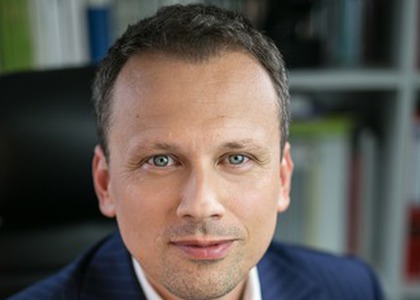> [Archived] Interviews

Interview with Rafa³ Wi¶niewski - Director of the National Center of Culture in Warsaw
The 4th edition of the International Music Festival of Central and Eastern Europe, named Eufonia, is taking place in Warsaw between the 18th and the 26th November of 2022.
Romanian pieces have been included in the concert programs ever since the first edition (George Enescu, Marțian Negrea, Béla Bartók, György Ligeti), and this year will also include the participation of Romanian artists, through the presence of the Transilvania Philharmonic Orchestra led by conductor Gabriel Bebeșelea.
More details about the Festival we learned from Dr. habil. Rafa³ Wi¶niewski - Director of the National Center of Culture in Warsaw
To begin with, please tell us what is the main purpose of this festival?
From the very beginning we wished to show the music from Central and Eastern Europe. We consider that German and Russian music are well presented around the world, and Central and Eastern Europe have much to offer. We're not talking only about the Visegrad Group (Czech Republic, Slovakia, Poland and Hungary), but also about Bulgaria and Romania, as well as about the other countries from Southern Europe. Moreover we expanded the festival's main focus to also cover the countries of Latvia, Lithuania and Estonia, as well as the Scandinavian countries, as we believe that music from that entire region is not fairly represented in the world. We have great composers, masters of music from this area and we are extremely content to be able to present their masterpieces. One of the greatest Polish composers is, clearly, Frederic Chopin, but we also have many other composers, amazing ones who created his art in Poland and one whom I must mention is the late maestro Krzysztof Penderecki, who opened our first edition of the festival. We also invited other great composers of this region and we had the pleasure of having Arvo Pärt, the Estonian composer, and in this edition we will also have Valentin Silvestrov, who this year was awarded the Opus Music Lifetime Achievement Award. We can say that the main idea and the main goal are presenting the music of Central and Eastern European countries, but each edition of the festival has its own theme.
This year's edition is dedicated to the Austro-Hungarian Empire, to the states that once were part of the Empire. What are the future plans and future themes?
The festival must be organised well in advance, so we already have the main themes for the next three years. I wouldn't reveal the themes yet, but we've already decided on them.
I know that ever since the first edition you included Romanian music in the festival - composers as George Enescu, Marțian Negrea - and this year will be the first time that Romania will be represented by its performers )The Transilvania Philharmonic Orchestra from Cluj Napoca). What are the plans for the future? Do you wish to include more Romanian composers and expand the collaboration with Romanian artists?
We believe that Romania has marvellous composers, both from the past and from the present, so it's no surprise that we are including Romanian music in the festival program. But this year we went as far as renting a charter flight to be able to bring the Romanian orchestra to Poland. And we chose to do this because they are special guests and it shows how much we appreciate the Romanian artists.
Regarding the next edition you've already finished planning it and choosing the themes; is Romania's participation also planned?
I've always tried not to answer this question directly because I can't reveal our plans yet. But, be sure that we will see to it that Romanian artists will be included in the program. I hope that after this edition of the festival, the public will want even more and will enthusiastically and curiously wait for the next edition. We will do our best to present the best artists and the best world written by the most important composers in the future.
Translated by Ioana Negrea,
University of Bucharest, Faculty of Foreign Languages and Literatures, MTTLC, year II
Corrected by Silvia Petrescu














